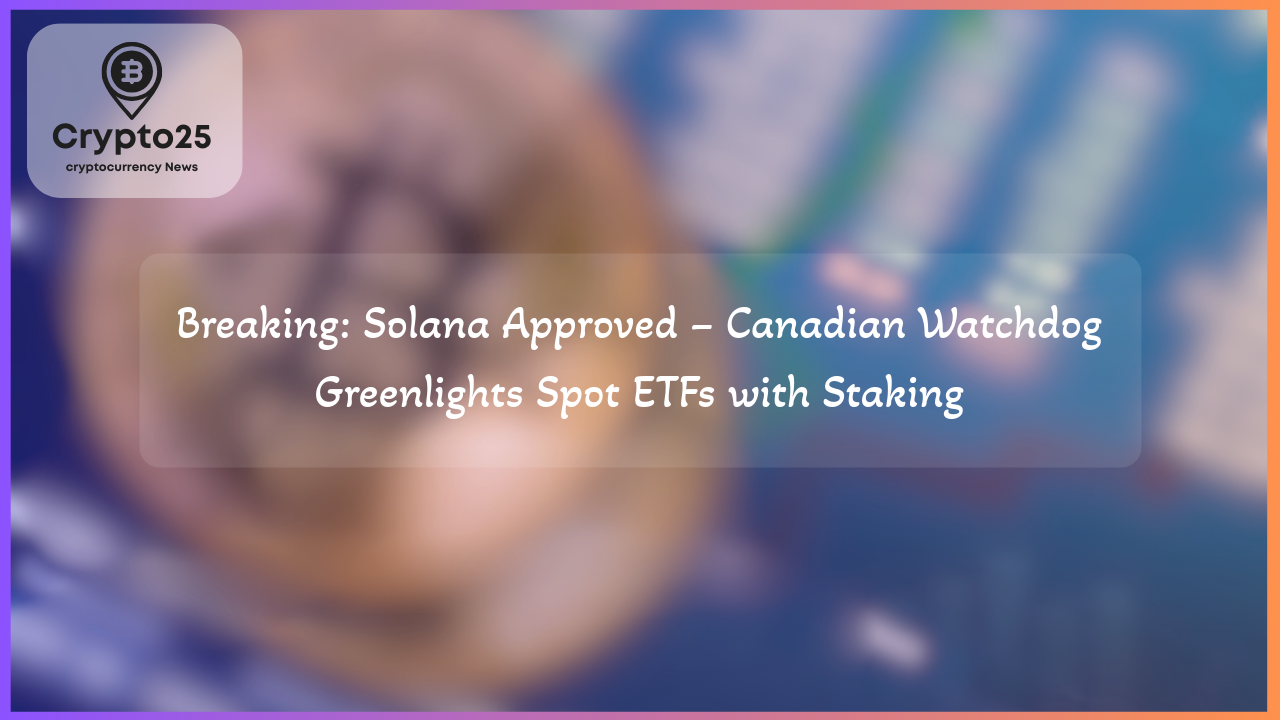
Canada is setting a groundbreaking precedent for the global crypto investment market with the world’s first spot Solana (SOL) exchange-traded funds (ETFs) launching on April 16, following approval by the Ontario Securities Commission (OSC). Backed by four prominent issuers—Purpose Investments, Evolve ETFs, CI Global Asset Management, and 3iQ—these ETFs directly hold Solana tokens, bringing innovative opportunities for investors seeking real-time exposure to this blockchain.
## Canada Introduces Spot Solana ETFs: An Innovative Milestone
The approval of Canada’s spot Solana ETFs highlights the nation’s progressive stance on cryptocurrency regulations and investment innovation. By offering products that directly hold SOL tokens, unlike futures-based ETFs, these funds provide investors with seamless real-time access to Solana’s market price. Each approved ETF will track a distinct Solana-related index, ensuring diverse investment strategies while preserving on-chain, verifiable backing. This step builds upon Canada’s earlier successes with pioneering the world’s first spot Bitcoin and Ethereum ETFs, further cementing its reputation as a trailblazer in crypto asset adoption.
This launch coincides with a growing demand for sophisticated cryptocurrency investment options, particularly those that blend decentralized finance (DeFi) features with traditional financial structures. For investors exploring Solana as a leading blockchain ecosystem, these spot ETFs offer an easily accessible, regulatory-compliant platform to engage in direct crypto exposure while participating in the network’s broader development.
## Solana Staking: A Key Component of the New ETFs
A standout feature of the spot Solana ETFs is their incorporation of staking rewards. According to data shared by Bloomberg’s senior ETF analyst Eric Balchunas, these funds plan to actively participate in Solana’s staking mechanism. Staking allows token holders to lock their SOL tokens on the blockchain in exchange for earning rewards, which are distributed back to ETF shareholders. This strategy has the dual advantage of potentially enhancing overall net returns and mitigating management fees, making the ETFs more cost-effective in the long run.
The staking yields from Solana could surpass those offered by comparable Ethereum-based ETFs due to the higher network reward rates associated with Solana’s protocol. Notably, this hybrid financial innovation bridges traditional securities like ETFs with decentralized blockchain mechanisms, appealing to a diverse pool of investors. Although the exact operational details and custodial arrangements for the staking process remain undisclosed, the OSC’s approval signals confidence in running compliant DeFi elements within conventional fund vehicles.
Canada’s regulatory ecosystem has proven itself agile in accommodating these hybrid products, encouraging financial institutions to leverage decentralized technologies while adhering to established legal frameworks. This progressive approach may push other global markets to consider similar solutions, particularly as investor interest in crypto-friendly investments grows.
## US Hesitates While Canada Accelerates Crypto ETF Adoption
While Canada positions itself as a frontrunner in cryptocurrency investment products, the US continues to lag in approving spot altcoin ETFs, including those linked to blockchain projects like Solana. Within the US, only futures-based Solana ETFs are available, which Balchunas notes have seen minimal adoption and limited assets under management (AUM). He further highlighted that newer crypto products, such as a recently launched leveraged XRP ETF, have outpaced Solana futures ETFs in terms of capital inflows—indicating tepid interest in SOL exposure among American investors so far.
The Canadian debut of spot Solana ETFs offers a compelling case study for regulated altcoin investment vehicles. Unlike futures ETFs, which only simulate exposure through derivatives, spot products offer direct token ownership and staking rewards, creating a potentially more attractive alternative for investors. If these products achieve widespread adoption, they may intensify pressure on regulatory agencies in more restrictive markets, such as the US, to reevaluate their stance on crypto ETFs.
With Solana joining Bitcoin and Ethereum in Canada’s regulated ETF ecosystem, Canadian investors gain an increasingly robust portfolio of crypto investment options. This reflects not only growing demand for direct blockchain integration in financial systems but also a clear preference among institutional players for regulated, transparent fund structures.
## The Road Ahead: A Transformative Shift in Global Crypto Investments
Canada’s approval of spot Solana ETFs represents a monumental shift in the intersection of traditional finance and blockchain technology. By marrying secure, regulatory-compliant frameworks with innovative staking components, these ETFs set a benchmark for the future of crypto asset management. Global regulatory agencies will undoubtedly observe the performance and adoption trends closely, particularly in jurisdictions where crypto innovation is hindered by regulatory ambiguity.
As the debate over crypto-friendly policies continues worldwide, Canada’s leadership may inspire other countries to innovate and release similar products. For now, this pioneering move places Canada firmly at the forefront of the digital finance revolution, offering investors groundbreaking tools to diversify their portfolios while actively engaging in blockchain ecosystems.
| Title | Details |
|---|---|
| Market Cap | $1.2 Trillion |
| Canada’s First Spot Solana ETF Launch | April 16, 2025 |
| Staking Rewards Integration | Included |
| US Solana ETF Status | Futures-Based Only |
